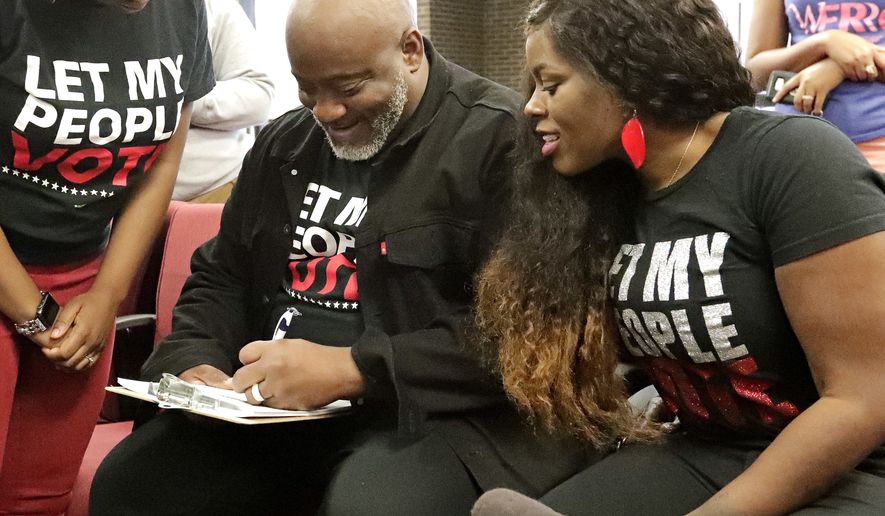A federal appeals court blocked a Florida law on Wednesday that would have made restoration of voting rights contingent on the payment of court-imposed fines.
The ruling by the three-judge panel of the 11th U.S. Circuit Court of Appeals overturned the state supreme court, which ruled last month the Florida Legislature could add fines, restitutions and fees, known as “legal financial obligations” (LFOs), to the definition of the sentence a felon must complete to vote again.
“Because the LFO requirement punishes those who cannot pay more harshly than those who can and does so by continuing to deny them access to the ballot box, Supreme Court precedent leads us to apply heightened scrutiny in asking whether the requirement violated the Equal Protection Clause of the Fourteenth Amendment as applied to these plaintiffs,” the appeals panel wrote. “When measured against this standard, we hold that it does.”
Liberal lawyers hailed the ruling as a victory for voting rights.
“The court unanimously ruled that a person’s right to vote cannot be contingent upon their ability to pay,” said Julie Ebenstein, a senior attorney with the ACLU’s Voting Rights Project. “This law is a modern-day poll tax. This ruling recognizes the gravity of elected officials trying to circumvent Amendment 4 to create roadblocks to voting based on wealth.”
Republican Gov. Ron DeSantis, whose office represented the state in litigation, indicated Wednesday they the state will ask the 11th Circuit for a full, en banc hearing on the case.
In 2018, voters approved the Voting Restoration Amendment, also called Amendment 4, that restored voting rights to former criminals who had served their sentences and completed parole and probation, a measure that affects an estimated 1.4 million people and that the appellate judges called “historic.”
During implementation, the legislature inserted a comma into the amendment language that permitted it to add LFOs. Mr. DeSantis asked the Florida Supreme Court for an opinion after a federal district judge blocked it, and in January the court upheld the Legislature’s wording.
The push to restore felons’ voting rights was led by Desmond Meade, whose sentence in 2001 involved three years in prison for a felon possessing a firearm. Meade worked tirelessly to get the signatures required to get Amendment 4 on the ballot, and then, as president of the Florida Rights Restoration Commission, for its passage.
Mr. Meade went live on Facebook after the 11th Circuit’s opinion, cautioning that Wednesday’s decision applied directly to the 17 plaintiffs and perhaps not all affected former felons.
“This was a grassroots effort where we were able to keep it elevated about racial anxieties and insecurities,” he said. “People are embracing this hope like, ’we won, we won, there’s a better tomorrow,’ when the reality is this is a lawsuit that was filed on behalf of these 17 plaintiffs. And here’s the deal: There’s many more steps in this journey, many move levels that have to be reached before we can claim some kind of victory.”
While the appeals court judges chided Florida for its “long history” of disenfranchising those who commit serious crimes, Amendment 4 was part of a national trend that has seen states, long reluctant to permit voting by convicted criminals, begin to offer paths back to the right to those no longer in custody.
“The contemporary voters of Florida … are not alone in finding the longstanding policy of categorically depriving felons of voting rights increasingly unpalatable,” the 11th Circuit panel wrote. “In the past two decades, nearly half of the states have in some way expanded felons’ access to the franchise.”
Fourteen states and the District of Columbia permit felons to reregister at some point upon leaving prison, depending on the crime, according to the ACLU.
Some supportive of the legislature and the Florida Supreme Court’s opinion expressed puzzlement at the 11th Circuit’s ruling.
“It seems to me that the Eleventh Circuit panel improperly used the concept of severability to change the meaning of Amendment 4,” said Matt Allen, an attorney with the Carlton Fields Tampa office. “It could have simply stricken the entire Amendment as unconstitutional. I don’t see how it was empowered to modify what the Florida Supreme Court definitely declared was the plain meaning of Amendment 4 — that only criminals who have paid their entire debt to society can have their voting rights restored — as it did. On first reaction, this result therefore seems to me to be policy-oriented.”
• James Varney can be reached at jvarney@washingtontimes.com.




Please read our comment policy before commenting.